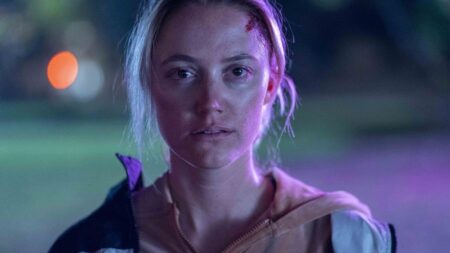Few films can coast on good intentions alone, but low-budget zombie romp “Queens of the Dead” comes close. Directed by Tina Romero, the delightful feature debut is a horror comedy chock-full of fun and meaningful ideas, most of which stop just short of fruition. Romero is notably the daughter of zombie movie progenitor George A. Romero (of “Night of the Living Dead” fame), and she channels her father’s decades-long fascination with undead ghouls as cinematic symbols for society at large. By filtering familiar hallmarks through a distinctly queer story set at a drag show gone awry, she channels the genre’s uglier, edgier leanings into a glamorous farce with a beating heart.
“Queens of the Dead” is the kind of movie that requires going with the flow — not by turning your brain off, but by keeping it especially sharp while sidelining expectations of refinement. Its aesthetic approach seldom lives up to its gestures toward camp as a guiding principle or its weighty themes (except, perhaps, in its surprisingly raucous final act). However, its flimsy aesthetic foundations are supported by remarkably well-formed characters.
The movie’s ludicrous, Church-set prologue sees a bedazzled Brooklyn drag queen matching on a queer dating app with a closeted pastor. As it turns out, this duplicitous man of God has been turned into a ghoulish “walker” with silver skin and gaunt cheekbones — Romero’s unique, tongue-in-cheek take on the zombie in a world of influencers and lifestyle addictions. One grisly chomp later, and religion has sucked the life out of a queer performer, a dichotomy further emphasized by a hard cut to an upbeat, Catholic-themed drag performance on Easter.
The overt religious symbolism continues courtesy of anxious male nurse Sam (Jaquel Spivey), who dances his way through hospital halls while offering his patients blood-red shots of Jell-O, like some perverse yet playful communion. None of this ever comes back around, which feels a little odd given its forceful arrival. However, it’s one of many stray analogies the film employs, speaking the language of metaphor-as-backdrop (if not foregrounded drama). What soon follows is a gradual, gentle introduction to a wide ensemble of characters with torrid histories — which is to say, falling-outs over drag show disagreements — as zombie mayhem slowly creeps in through the corners of the frame.
Before the splatter kicks off — courtesy of a televised announcement from a cameoing Tom Savini, a zombie makeup legend — Sam learns that his former boss and best friend, the overworked butch DJ and drag producer Dre (a charismatic Katy O’Brien) is in sudden need of a new lead dancer at a dive bar. As Sam makes his way to Bushwick, in the hopes of resurrecting his dormant stage persona, Romero acclimatizes us to the catty, interpersonal backstage drama of the cabaret’s moving parts, endearing us to each character in the process.
As curtain approaches, Dre is pulled in a million different directions by her various performers — played by the likes of drag queen Nina West and Broadway’s Tomás Matos — in addition to her ditzy intern Kelsey (Jack Haven), and her conspiratorial and amusingly behind-the-times brother-in-law Barry (Quincy Dunn-Baker). Elsewhere, as the city descends into chaos, a less well-rounded subplot sees Dre’s pregnant wife Lizzy (Riki Lindhome) desperately making her way to the bar, with the help of a transgender out-of-towner (Eve Lindley).
The ensemble, made up of mostly queer performers, is a treat from scene to scene despite being saddled with dialogue that grasps at humor with every line, but only lands about half the time. However, the movie springs to life about midway through, once the bar patrons realize the situation. They’re soon assisted by a makeshift vigilante crew led by a delightfully terse Margaret Cho as Pops, a hard-as-nails butch lesbian who makes an applause-worthy entrance on an electric scooter.
Pops quickly becomes the center of a fleeting but meaningful subversion of the age-old zombie trope of killing off bitten denizens, which centers humanity above individual survival instincts and irrational fears. Some rapid-fire jokes are laced with intergenerational queer tension, and Cho’s own status as a queer elder helps harken back to a sense of community under siege during the AIDS crisis, whose specter looms large over this subplot involving tenderness toward those infected, when the world treats them with cruelty.
“Queens of the Dead” is never stylized enough to land alongside most eye-popping cult classics. However, its gestural sweetness helps cross this divide; even its most overwrought moments are underlined by an amiable nature seldom seen in the zombie genre. Its political musings are straightforward, but their overt nature allows the movie to play out in the form of a saccharine, campy, musically-tinged comedy that zips by, never overstaying its welcome.
Read the full article here








